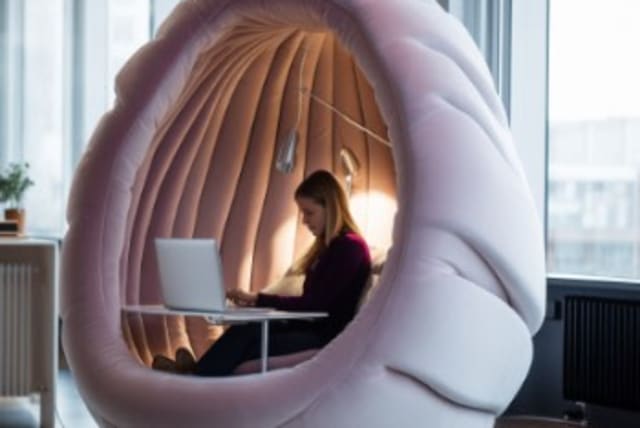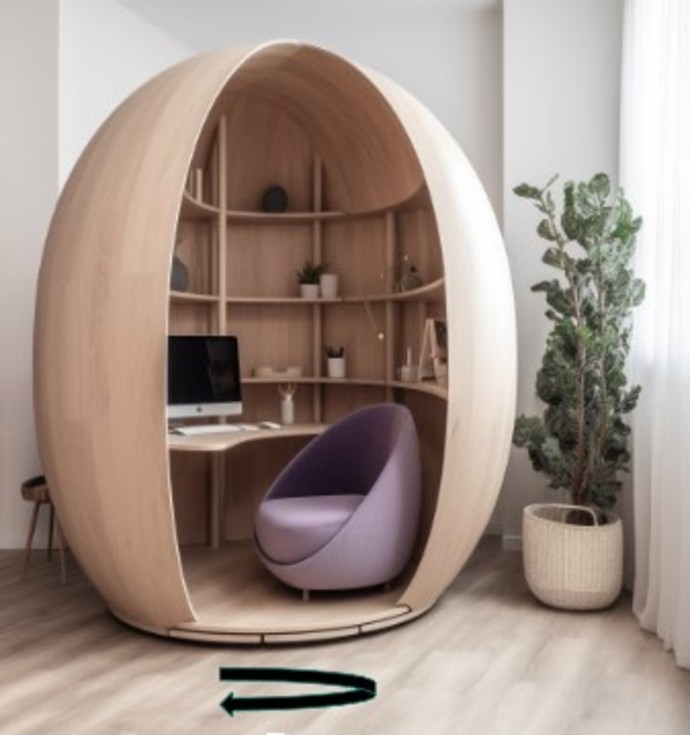The faculty rooms of the future

Privat study and meeting cells, mobile work units and more: this is how an innovative designer sees the future of traditional faculty rooms in schools.
Einat Azulay Polon earned her Bachelor’s degree in Bezalel Academy of Arts and Design Jerusalem almost twenty years ago. Eventually, she found herself integrated as an art teacher in the education system, and was drawn into this love ever since.
Over time, Einat realized that precisely in the beating heart of the school - the teachers' room - she was missing something. Too many times Einat realized that the teachers' rooms are not built and designed in a way that meets the needs of the teachers - congestion, crowding, noise, lack of privacy, no place to work quietly, or just to recharge in the middle of a busy day.
Einat's thesis, as part of the Master's degree program in industrial design in Bezalel, deals with this issue. The work, called Cocoon, presents a private cell, a mobile work unit located in the school and aims to reduce pressure from the teachers' room.
the Cocoon is about 6 square meters in size, provides teachers with a private work area, which can accommodate up to 2-3 people for meetings or individual lessons, Or even for a parent-teacher meeting. The mobile work unit is connected to electricity and WiFi if necessary. "The interior designers that the schools hire to design the teachers' room do not know the daily needs of the educational staff. The result is a teacher's room that can be beautiful, but not practical," explains Einat Folon.
Einat’s work is as a part of Bezalel’s Master’s program in industrial design. Headed by Dr. Romi Mikulinsky. This year exhibitions
discusses diverse issues intertwined in our lives: education, gender, politics, health, culture, and technology.
Bezalel Academy of Arts and Design Jerusalem was established in 1906 and is the oldest and leading academy in Israel for arts, design and architecture and one of the most important academies in the world. Since its inception, it has strived to promote work that draws inspiration from history and the local visual heritage, but at the same time emphasizes the promotion of research and innovation, the application of advanced technologies and multidisciplinary and creative teaching, while collaborating with research bodies, academia and industry in Israel and around the world.
Jerusalem Post Store
`; document.getElementById("linkPremium").innerHTML = cont; var divWithLink = document.getElementById("premium-link"); if (divWithLink !== null && divWithLink !== 'undefined') { divWithLink.style.border = "solid 1px #cb0f3e"; divWithLink.style.textAlign = "center"; divWithLink.style.marginBottom = "15px"; divWithLink.style.marginTop = "15px"; divWithLink.style.width = "100%"; divWithLink.style.backgroundColor = "#122952"; divWithLink.style.color = "#ffffff"; divWithLink.style.lineHeight = "1.5"; } } (function (v, i) { });

